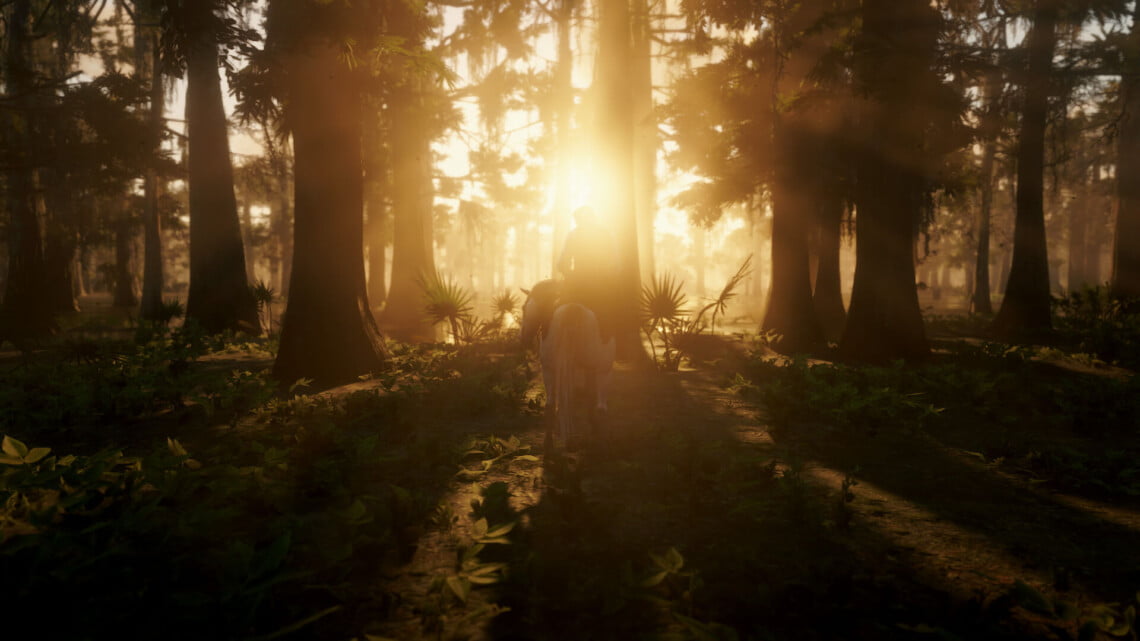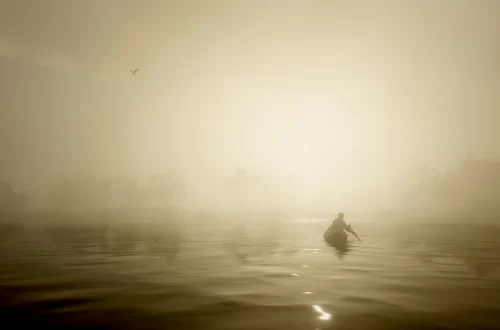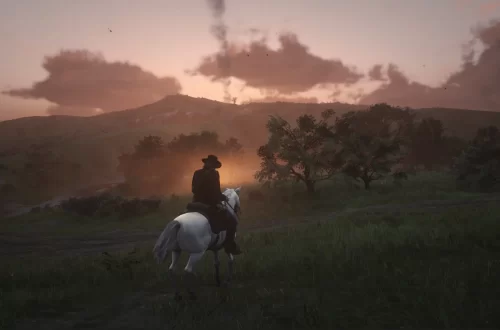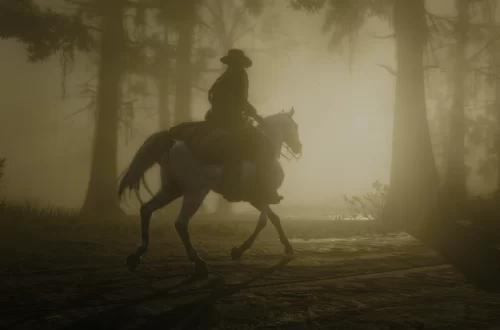How Pleasance represents Eden, plus miscellaneous allusions to Paradise Lost and the Romantics in Red Dead Redemption 2
All articles on this site feature detailed discussion of literary allusions in Red Dead Redemption 2, and as such contain unmarked major and minor spoilers for the game, and occasionally the eventual fates of some characters in Red Dead Redemption. Read at your own risk.
I’ve discussed Paradise Lost in some depth now, but there are still quite a few allusions that didn’t fit elsewhere. This also seems like the best place to discuss the other allusions to the Romantics in the game. Here’s a roundup of the essays, followed by a list of the other references the game makes.
- Death and the Devil: Dutch Van der Linde & Paradise Lost
- “Desperate Revenge”: Paradise Lost & Micah Bell
- “Red Right Hand”: Arthur Morgan as a Christ Figure
- Knowing: Red Dead Redemption 2 & the Inversion of Paradise Lost
- Fate & Free Will: The Meaningless Choices of Red Dead Redemption 2
- To Turn Towards Death: The Secret Mythology in RDR2
- Virgin Lands: RDR2’s Dream of Colonizing Eden
Themes
Eden. As previously discussed, Evelyn Miller’s work sometimes comments on the myth Paradise Lost is based on. There are several other examples of this. In “An American Eden,” he says that in capitalism and industrialism, “we are as Adam, eating once more of the apple.” In “America,” he asks, “Was this the method by which the Serpent and the Apple removed us from Eden?” and discusses “The foolish part of man that tells him he is immortal. That tells him, that whispers like the serpent, that seduces like the apple, that charms like Eve, that tells him he is God.”
Paradise. The word “paradise” is emphasized several times throughout the text. A non-comprehensive list:
- In one of Blind Man Cassidy’s prophecies, he tells Arthur, “Bad news awaits you, sir. But beyond the news, paradise awaits. Paradise …”
- Dutch calls Tahiti “an untouched paradise” ( “Urban Pleasures”).
- When Bill asks about Tahiti, Dutch tells him, “I hear it’s paradise” (“Revenge is a Dish Best Eaten”).
- Dutch promises Javier, “It’ll be paradise, son” (“Our Best Selves”).
- And at Clemens Point, he has the following conversation with John:
Death of a child. Lord Byron took custody of Allegra, his illegitimate daughter with Claire Clairmont, and sent her to be educated in a convent. Clairmont desperately wanted to keep her daughter with her, but Byron refused, and Clairmont had little recourse. Byron didn’t truly seem to care about the child, but he claimed to be doing it because Clairmont lived an amoral lifestyle — the very height of hypocrisy. Allegra died of typhus in the convent where Byron left her (Gordon 416). Dutch bears a similar degree of responsibility for Arthur’s death, since he encourages him to collect debts for Strauss. (For more on Dutch as Death and Lord Byron, read here.)
Hubris. Hubris is a central theme of Paradise Lost: Satan’s rebellion; Eve eating the apple. As I’ve touched on, we see this in RDR2 as well. Marko Dragic dies because he attempts to create life. The mission name “Icarus and Friends” alludes to Icarus’s act of hubris. Two Points of Interest feature people who have died testing flying machines; one of the films in the game refers to another. (An accidental irony of the game is the hubris behind its creation; there is simply an enormous amount of cut content in the game files that shows it was originally intended to be much bigger than it already is. Suitably, although the game is an impressive achievement, it contains many errors and inconsistencies, and is glitch-filled even 6 years after its release.)
Satan’s revenge, another form of hubris, is the driving force behind the plot of Paradise Lost. God says of Satan: “so bent he seems/On desperate revenge, that shall redound/Upon his own rebellious head” (III-84-86). As previously discussed [link], in the Biblical schema, vengeance belongs to God, making John’s revenge an act of hubris.
Arthur often says that revenge is foolish. What’s interesting about the way this theme appears in the game is that most characters are never directly punished for taking revenge. Micah isn’t (for killing the couple in Strawberry); Sadie isn’t (for killing scores of O’Driscolls, or for helping to kill Micah); Dutch isn’t (for killing Leviticus Cornwall – he is for Bronte and Micah’s deaths); Charles isn’t (for killing one of the men killing buffalo, or for helping to kill Micah). Two of these characters die eventually, but there are no narrative threads connecting their revenge with their deaths. The narrative doesn’t condemn revenge generally, but John’s specifically.
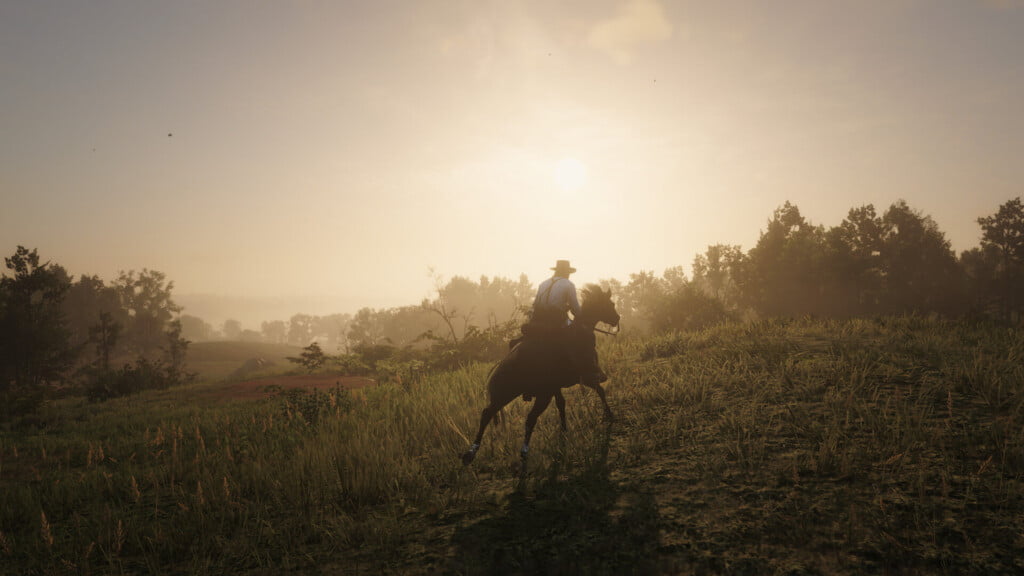
Motifs
Snakes. The game’s snake motif is an allusion to Satan tempting Eve, and appears in the following places (for more pictures, see this post):
- The Snake Mound Point of Interest
- Copperhead Landing (named for the way it resembles a snake’s head on the map)
- The carving “Where the death adder spits” on a tree outside Braithwaite Manor
- The 12 types of snakes that can be found in the game
- Arthur and John’s drawings of the black-tailed rattlesnake, cottonmouth, fer de lance snake, rattlesnake, and red boa
- The snake in the Maenads painting at La Kay
- Fauna of America Card No. 5, the Coral Snake
- The giant dead snake outside Pleasance
- The Old World Scripts Point of Interest (carved around the writing)
- Arthur calls Dutch and Micah both snakes — Dutch in his journal; Micah in “Red Dead Redemption” and camp dialog
- The Serpent (Satan) is alluded to in Evelyn Miller’s “America”
- Three random encounters are with strangers who have been bitten by snakes
- The mission name “American Venom”
- “The water is black with venom” is written on the wall in the cabin at Bayall Edge. As venom is, notably, not black, the writers must have felt the implication here was important. The words refer to Blackwater, obviously, but also to the events that occurred there. Whether the venom in this image is Dutch’s or Micah’s, well, who can say
- The Ornate Dagger has a snake design fitted to the upper part of the blade. The snake is wrapped around what appears to be a blade or a stick, alluding to the Rod of Asclepius, a symbol of healing. This is both fitting and ironic, since vampires are immortal, but also dead. Ascelpius appears in Paradise Lost as “the god/In Epidaurus” (IX.506-507). More meaningfully, he’s alluded to with the constellation Ophiuchus (II.709) when Satan prepares to fight Death.
In addition, the vampire character who carries the Ornate Dagger is partially based on a character in the short story “The Vampyre” by John William Polidori. This in turn was based on his friend Lord Byron’s “Fragment of a Novel,” and the vampire character is based on Byron (Wikipedia). In Polidori’s story, the titular vampire is identified partially by an unusual dagger he carries. Thus this almost-hidden symbol ties together Byron, Satan, and Death, many of the major influences on Dutch’s character. (Note: It isn’t possible to see the “statuette handle” in-game, but judging from the game files, it features a man between two skeletons.)
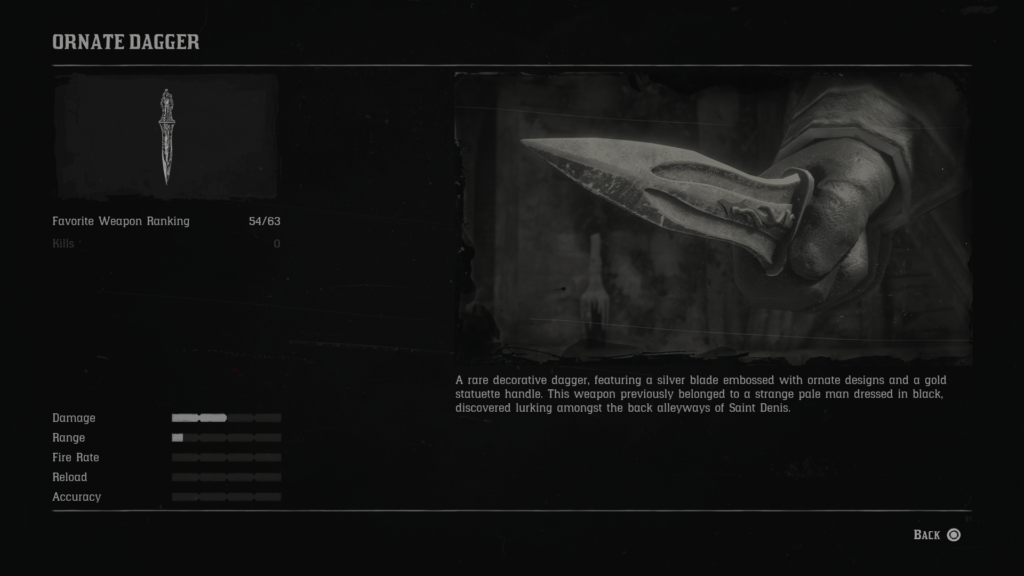
Names
King Arthur. One of the poem’s shared or doubled allusions is to King Arthur (“Uther’s son” [I.580]), which is where Arthur Morgan gets his name. Morgan was King Arthur’s sister, and in the game’s formulation represents Arthur’s “bad” half. I’ll discuss Arthurian legend in depth soon.
Agent Milton. Andrew Marvell’s poem “On Mr. Milton’s Paradise Lost” was included as a preface to the second edition. This is presumably where Agent Andrew Milton gets his first name. (“Milton,” obviously, is from the author of the epic poem.)
Trelawny & Pearson. Josiah Trelawny is named for Edward John Trelawny, a friend of Lord Byron, Mary Wollstonecraft Shelley and Percy Bysshe Shelley. The historic Edward Trelawny had a tense relationship with his father; Josiah says both his parents treated him poorly (“The First Shall Be Last”). Edward lived a peripatetic existence, like Josiah, and “abandoned a wife and two daughters back in England” (Gordon 407). Josiah is frequently away from his wife and two sons in Saint Denis, although unlike Edward, he often returns to them1. Josiah says that his family hails from Cornwall, which is where Edward was from. Edward made up stories about his time in the navy (407), which may have influenced the character of Simon Pearson.
However, it’s more likely that Pearson is based on Edward Williams, a friend of the Shelleys who “present[ed] himself as an old salt when in fact he had not had much experience as a sailor” (381). In Pearson’s companion activity, he reveals that he was only in the navy for perhaps a few months. Sadly, Percy Shelley put his faith in Trelawny and Williams, and the three men designed a boat that would soon cause Shelley and Williams’ deaths by drowning (413, 441).

The Count. The Count’s name is possibly an allusion to Lord Byron’s friend, Count Pietro Gamba. Byron’s granddaughter, Lady Anne Blunt, is known for her substantial contributions to the development of the Arabian horse breed. An enormous percentage of Arabian horses today are descended from her stables (“Anne Blunt, 15th Baroness Wentworth”). This is likely why The Count is an Arabian.
Places: Pleasance and Other RDR2 Locations
Pleasance. Pleasance is the most prominent Point of Interest in the game. You have to drive through it during “American Distillation.” As we’ll see, allusions to many works converge here, but Paradise Lost is the most significant. A pleasance is “a secluded enclosure or part of a garden” (Oxford English Dictionary); Eden is described in Paradise Lost as a walled garden. “Eden” means “delight,” which is another meaning of “pleasance.” A giant dead snake hangs in a tree in the woods to the east of the town, alluding to Satan and the Tree of Knowledge. The only building in Pleasance you can see clearly while looking at the snake is the schoolhouse, which represents knowledge. The tree that’s fallen on the schoolhouse is also an allusion to the Tree.
The graffiti on one of the houses declares that the inhabitants were “unclean sinners” and “ill with sin.” After eating of the tree, Adam tells Eve they should cover themselves “that this newcomer, shame,/There sit not, and reproach us as unclean” (IX.1097-1098). Ten people in the town were murdered (although it’s possible some of them took their own lives), presumably by the person or people who decided the town (or at least some of its inhabitants) was in a state of sin. The people here were, in a sense, driven out of their walled garden because of their supposed sin, just as Adam and Eve were. (The game sometimes becomes an echoing canyon of referentiality: the name also alludes to Pleasance House, a location from the first Redemption game. There is no apparent connection between the house and the town.)
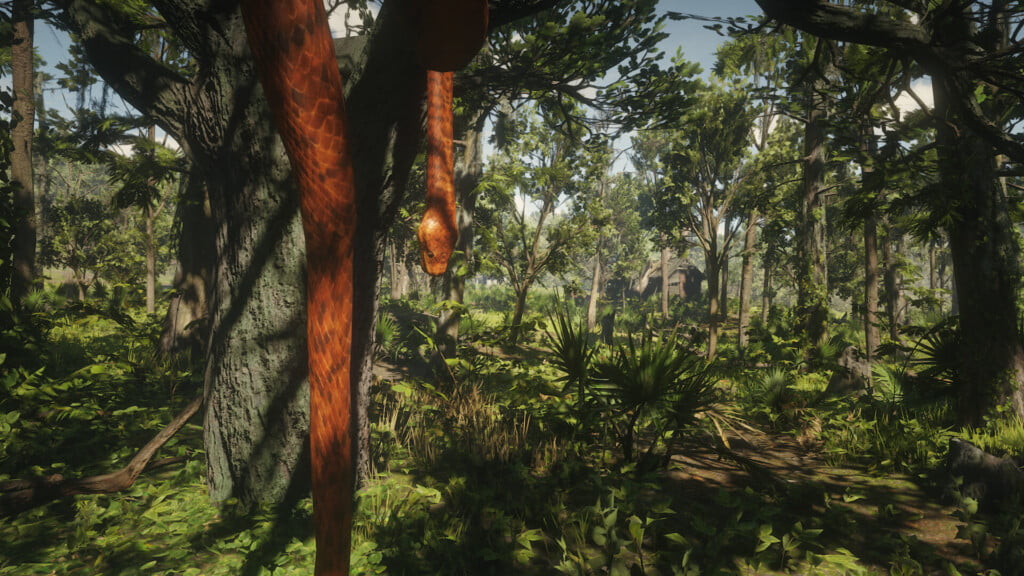
Colter & Hell. The poem and the game both begin in medias res after a badly botched attempt to take on a much greater power (God; the United States government). The gang has to travel through a blizzard; Milton describes the landscape of hell thus:
Beyond this flood a frozen continent
Lies dark and wild, beat with perpetual storms
Of whirlwind and dire hail, which on firm land
Thaws not, but gathers heap, and ruin seems
Of ancient pile; all else deep snow and ice.Paradise Lost II.587-591
Elysian Pool. The poem describes a place “where the river of bliss through midst of heaven/Rolls o’er Elysian flowers her amber stream” (III.358-359). The pond near Butcher’s Creek is called Elysian Pool. The Elysian Fields were a lovely part of the ancient Greek concept of the underworld. Suitably enough, the lead and arsenic in Elysian Pool may well send people to the afterlife.
Rhodes. Satan and the other fallen angels are turned into serpents as a punishment for Satan’s transgression in the Garden. This passage alludes to Ophiusa (X.528), which is now known as Rhodes (Milton 911).
Hani’s Bethel. The poem mentions the Biblical location Bethel (I.485). One of the more interesting locations in the game is called Hani’s Bethel (which is also an anagram for “Beth’s Alien.” Does this mean anything? Who knows!). The suicide cult found there is based on the Heaven’s Gate cult. This is a nested allusion to Paradise Lost:
The stairs were such as whereon Jacob saw
III.510-515
Angels ascending and descending, bands
Of guardians bright, when he from Esau fled
To Padan-Aram in the field of Luz,
Dreaming by night under the open sky,
And waking cried, This is the gate of heaven.
After this vision, Jacob changed the place’s name from Luz to Bethel (Milton 874).
The Tempest. The poem makes several allusions to William Shakespeare’s play The Tempest. As previously described, the game often alludes to the poem’s allusions themselves. Tempest Rim, Caliban’s Seat, and the Guarma episode are allusions to the play.
Beaver Hollow. Teaching Adam what death is, the archangel Michael explains: “many are the ways that lead/To his grim cave, all dismal; yet to sense/More terrible at the entrance than within” (XI.468-470). It’s possible this had some influence on the design of Beaver Hollow, where all the horrifying mutilated bodies are displayed outside the cave, and not inside it. Dutch’s tent is also set up in such a way that its entrance almost seems part of the cave mouth, and as we’ve seen, Death is one of the influences on Dutch’s character.
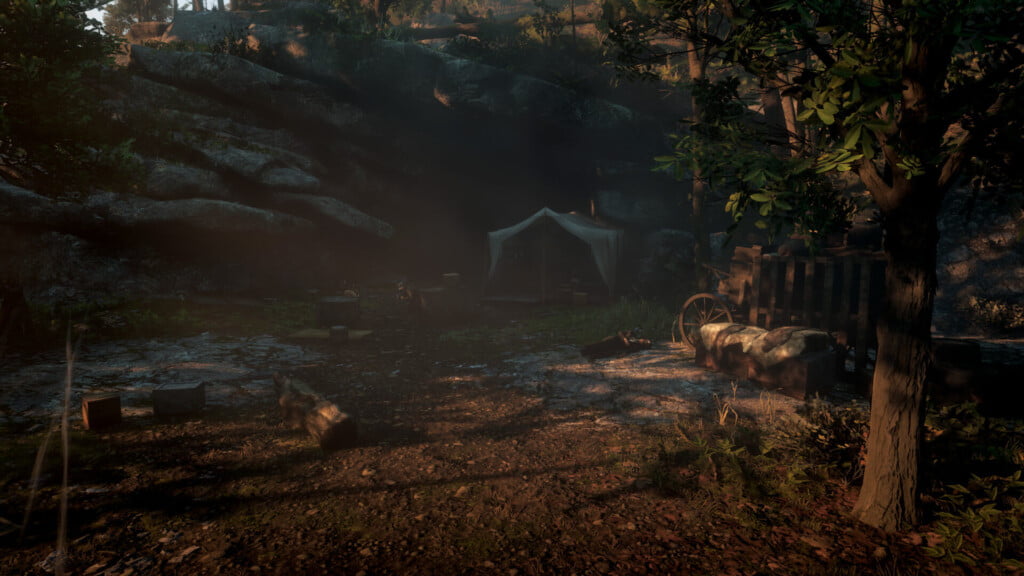
Mission Names
Paradise Mercifully Departed. Well, you get it.
The Aftermath of Genesis. Part of the poem (X.200-208) describes how humans will have to labor for food as punishment for eating from the Tree of Knowledge. This, and obviously Genesis itself, is where “The Aftermath of Genesis” gets its name. Arthur learns to hunt in the mission.
Fleeting Joy. The phrase “fleeting joys” (X.741) may be the source of the mission name “Fleeting Joy”; however, that phrase is possibly too common to say with certainty.
Sodom? Back to Gomorrah. Paradise Lost makes a few allusions to the Biblical city of Sodom, which is also alluded to in the mission name “Sodom? Back to Gomorrah.”
Welcome to the New World. The phrase “new glorious world” (X.721) is an allusion to The Tempest‘s “brave new world” (V.184); the mission name “Welcome to the New World” alludes to both of these.
Miscellaneous
Vetter’s Echo. As we’ve seen, Vetter’s Echo contains two poems that allude to Lord Byron. On the same desk is the cigarette card for the black widow spider, which appears to be the western black widow, Latrodectus hesperus. Hesperus “is the Evening Star, the planet Venus in the evening” (Wikipedia). Venus is also the Morning Star, aka Lucifer, which was Satan’s name prior to the Fall. Additionally, Lord Byron translated a poem by Sappho called “Hesperus the Bringer.” Of course, it’s possible that these are coincidences, but given the level of detail seen in the Orphean allusions and the Ornate Dagger (above), these facts seem likely to be significant.
These items are located in Vetter’s Echo in particular because when Byron went to Cambridge, the rules didn’t allow him to bring a dog. He instead brought a “tame” bear (Francis). If you’ve been to Vetter’s Echo, the significance will be clear.
Blind prophets. John Milton was totally blind when he wrote Paradise Lost. The seers, Blind Man Cassidy and the Soothsayer, are also blind; their prophecies often relate to the epic. (Blind prophets are also an archetype. The blind prophet Tiresias is alluded to in III.36.)
Ozymandias. Percy Shelley’s poem is the source of the line “Look on my Works” (11), which serial killer Edmund Lowry writes near one of the bodies he leaves scattered around the countryside. The poem is about hubris, a theme the game frequently touches on.
Epitaph. Part of Greta Van der Linde’s epitaph is “There was grace in her steps, love in every gesture.” This is a misquotation of VII.488-489, which describes Eve: “Grace was in all her steps, heaven in her eye,/In every gesture dignity and love.”
Puritanism. John Milton was a Puritan. Eventually, the Puritans became known as Congregationalists, which is Reverend Swanson’s religion (thank you to my very smart friend Bear for answering my heathen question about this).
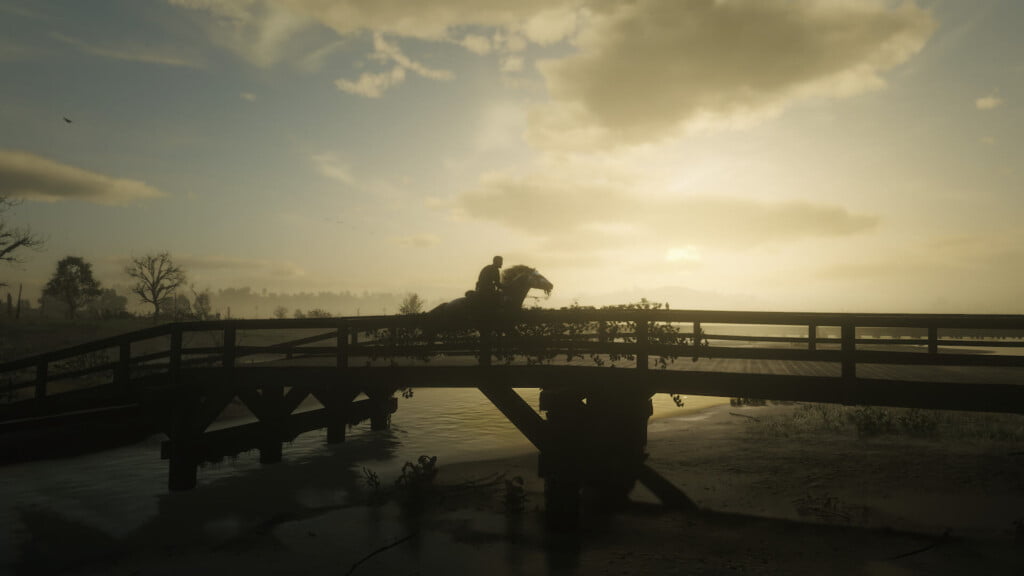
New here? Visit the Table of Contents to read the essays in order, or the Index & TL;DR to explore the site by topic. New essays are published Wednesdays at 1 p.m. E.T./10 a.m. P.T. Sharing the site is always appreciated!
- Hidden dialog that can be overheard in Saint Denis. Trelawny will also approach Arthur and discuss his family with him if the dialog is triggered. ↩︎
Bibliography
Expand to see sources.
- “Anne Blunt, 15th Baroness Wentworth.” Wikipedia, Wikimedia Foundation, 18 June 2024, en.wikipedia.org/wiki/Anne_Blunt,_15th_Baroness_Wentworth.
- Blevins, Pearl, and David Hill Radcliffe. “Pietro Gamba: A Narrative of Lord Byron’s Last Journey to Greece.” Lord Byron and His Times, lordbyron.org/contents.php?doc=PiGamba.1825.Contents. Accessed 27 Aug. 2024.
- “Congregationalism.” Encyclopædia Britannica, Encyclopædia Britannica, inc., kids.britannica.com/kids/article/Congregationalism/444109. Accessed 27 Aug. 2024.
- “Edward John Trelawny.” Wikipedia, Wikimedia Foundation, 10 Aug. 2024, en.wikipedia.org/wiki/Edward_John_Trelawny.
- “Fragment of a Novel.” Wikipedia, Wikimedia Foundation, 27 Apr. 2024, https://en.wikipedia.org/wiki/Fragment_of_a_Novel.
- Gordon, Charlotte. Romantic Outlaws: The Extraordinary Lives of Mary Wollstonecraft & Mary Shelley. Random House, 2016.
- “Hesperus.” Wikipedia, Wikimedia Foundation, 24 Aug. 2024, en.wikipedia.org/wiki/Hesperus.
- Houser, Dan, et al. “Red Dead Redemption II.” Rockstar Games, 2018.
- Milton, John. The Major Works. Edited by Stephen Orgel and Jonathan Goldberg, Oxford University Press, 2008.
- “Ophiuchus.” Encyclopædia Britannica, Encyclopædia Britannica, inc., https://www.britannica.com/topic/Ophiuchus. Accessed 27 Aug. 2024.
- “Pleasance.” Oxford English Dictionary, Oxford English Dictionary, https://www.oed.com/dictionary/pleasance_n1. Accessed 26 July 2024.
- Sappho. “Hesperus the Bringer.” Translated by George Gordon Byron, LiederNet, www.lieder.net/lieder/get_text.html?TextId=74178. Accessed 27 Aug. 2024.
- Shelley, Percy Bysshe. “Ozymandias.” Poetry Foundation, https://www.poetryfoundation.org/poems/46565/ozymandias.
